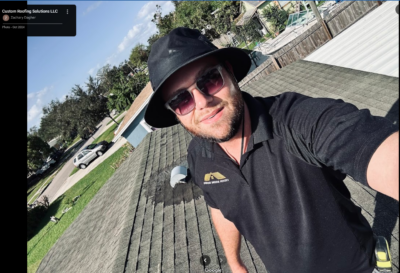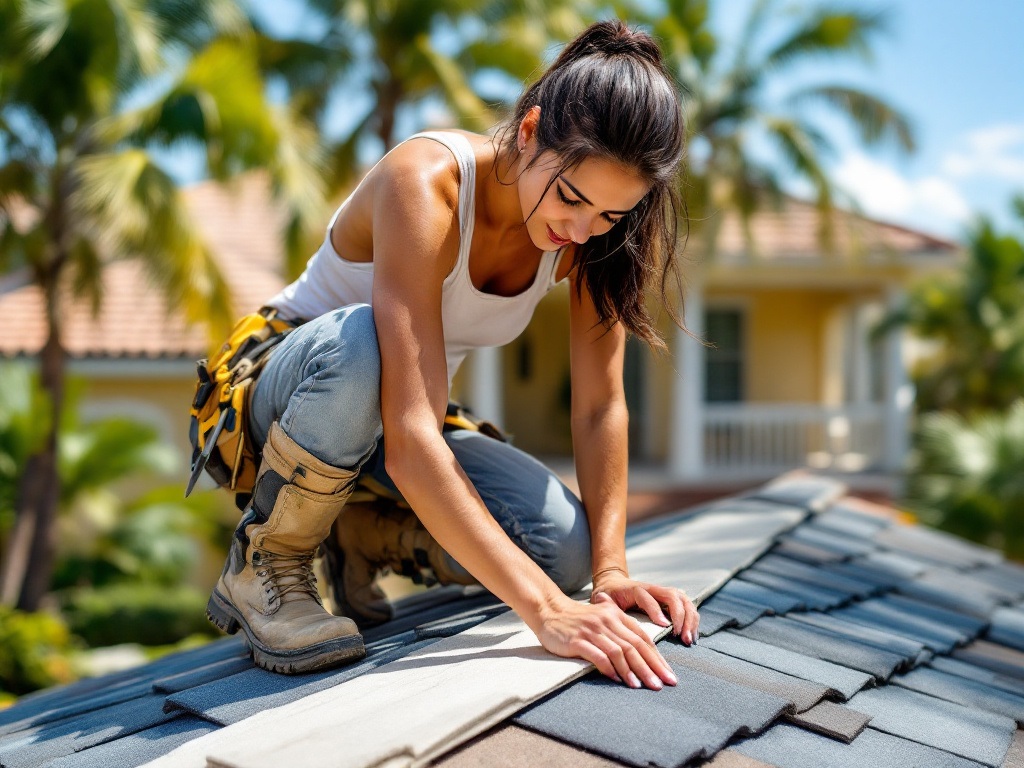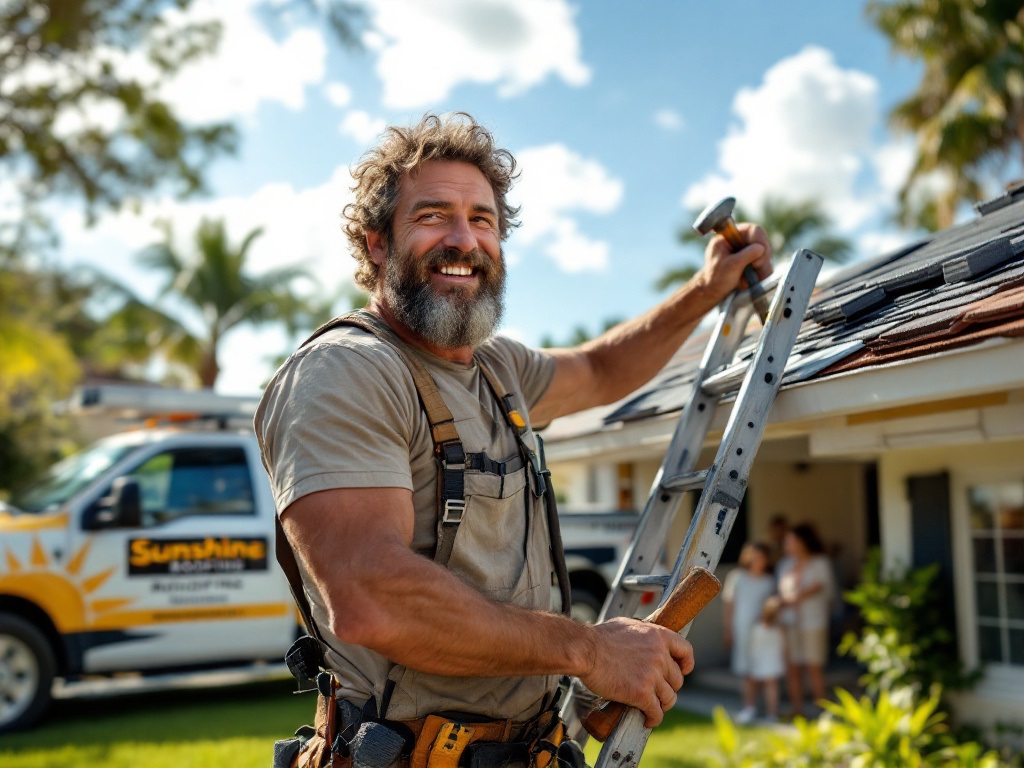
Expanded Guide to Estimate Roof Replacement in Jacksonville, Florida.
Introduction to Estimate to Replace Roof in Jacksonville, Florida.
Securing an accurate estimate to replace roof in Jacksonville is the first step for homeowners considering a roof replacement. Jacksonville’s unique climate, characterized by intense sun, heavy rains, and hurricane risks, demands durable roofing solutions. A professional estimate evaluates factors like material choices, labor costs, and local building codes to provide a realistic budget. Homeowners should prioritize contractors familiar with Northeast Florida’s weather patterns to ensure their new roof withstands seasonal challenges.

Understanding the scope of your project is critical. An estimate to replace roof in Jacksonville typically includes inspections, material measurements, and labor breakdowns. Reputable contractors will also account for permit fees and potential structural repairs. By obtaining multiple estimates, homeowners can compare pricing and services, ensuring transparency and value.
Key Elements of a Roof Replacement Estimate:
- Material costs (shingles, underlayment, flashing)
- Labor fees based on roof complexity and size
- Jacksonville permit and inspection costs
- Waste disposal and cleanup charges
Jacksonville homeowners should scrutinize estimates for hidden fees or vague line items. For instance, coastal areas may require hurricane-resistant materials, impacting the final cost. Always verify that contractors include Jacksonville-specific considerations, such as compliance with Florida Building Code wind resistance standards.
Choosing a contractor experienced with Jacksonville’s climate ensures your estimate reflects realistic timelines and material longevity. For example, metal roofs may cost more upfront but offer superior durability against storms. By prioritizing local expertise, homeowners can avoid underestimating project costs and ensure their investment protects their home for decades.
Key Factors Influencing Your Estimate to Replace Roof.
The estimate to replace roof in Jacksonville varies based on roof size, pitch, and material selection. Steeper roofs require additional safety equipment and labor, increasing costs. Similarly, larger homes need more materials, directly impacting the budget. Jacksonville’s humidity and salt air also influence material choices—clay tiles and metal are popular for their resistance to corrosion and mold.
Local labor rates and contractor availability also play a role. During peak storm seasons, demand for roofing services in Jacksonville surges, potentially raising labor costs. Homeowners should request estimates during off-peak periods if possible and confirm whether contractors subcontract work, which can affect pricing and quality.
Factors Impacting Roof Replacement Costs:
- Roof accessibility and structural complexity
- Choice between asphalt, metal, or tile materials
- Need for decking repairs or ventilation upgrades
- Jacksonville’s seasonal weather delays
Material durability is a key consideration. Asphalt shingles, while affordable, may need replacement sooner in Jacksonville’s harsh climate compared to metal or tile. Labor costs also depend on project timelines—emergency repairs after hurricanes often incur premiums.
To optimize your estimate to replace roof in Jacksonville, discuss energy-efficient options like reflective coatings, which can lower cooling bills. Additionally, consider long-term warranties that offset future repair costs. Partnering with a contractor who offers detailed breakdowns ensures you understand where every dollar goes, from materials to cleanup.
Jacksonville Climate: How Weather Affects Roofing Costs.
Jacksonville’s subtropical climate significantly impacts the estimate to replace roof. High humidity accelerates wear on asphalt shingles, while hurricane-force winds demand impact-resistant materials. Contractors often recommend reinforced underlayment or metal roofing to combat these challenges, which can raise initial costs but reduce long-term repairs.
Frequent thunderstorms also contribute to moisture buildup, requiring proper ventilation systems to prevent mold. Roofers may include upgraded ridge vents or soffits in estimates to address Jacksonville’s humidity. These additions ensure compliance with local building codes and improve roof lifespan.
Weather-Related Cost Considerations:
- Hurricane straps or wind mitigation features
- Mold-resistant underlayment and insulation
- Impact-rated shingles or metal panels
- Enhanced drainage systems for heavy rains
Post-storm inspections often reveal hidden damage, such as weakened decking or leaks, which contractors must factor into estimates. Jacksonville homeowners should prioritize materials rated for 130+ mph winds to meet Florida’s strict codes.
Insurance discounts may apply for storm-resistant upgrades, indirectly lowering out-of-pocket expenses. Discussing climate-specific solutions with your roofer ensures your estimate to replace roof in Jacksonville balances upfront costs with durability. Investing in weatherproofing now can prevent costly emergency repairs during hurricane season.
Step-by-Step Guide to Requesting a Roof Replacement Estimate
Requesting an estimate to replace roof in Jacksonville begins with researching licensed contractors. Verify credentials via the Florida Department of Business Regulation and read reviews to shortlist reliable professionals. Schedule in-person inspections, as accurate measurements and damage assessments are crucial for precise estimates.
During the inspection, discuss material preferences, timelines, and budget constraints. Reputable contractors will explain code requirements and suggest materials suited to Jacksonville’s climate. Ensure the estimate includes itemized costs for labor, materials, permits, and cleanup.
Steps to Secure a Detailed Estimate
- Document existing roof damage with photos.
- Compare quotes from 3–5 Jacksonville contractors.
- Ask about warranties and post-installation support.
- Confirm compliance with Jacksonville permit processes.
Avoid contractors who provide estimates without onsite evaluations, as these often overlook structural issues. After receiving estimates, review payment terms and project timelines. Jacksonville homeowners should also check for manufacturer rebates on materials like energy-efficient shingles.

Once estimates are finalized, ensure contracts include clauses for unexpected repairs. For example, water-damaged decking discovered mid-project may increase costs. Clear communication with your roofer ensures transparency and helps avoid budget overruns.
Comparing Roofing Materials: Durability and Cost for Jacksonville Homes
Choosing the right material is pivotal for an accurate estimate to replace roof in Jacksonville. Asphalt shingles are budget-friendly but may last only 15–20 years in the humid climate. Metal roofs, though pricier, offer 50+ years of durability and reflect UV rays, reducing energy costs.
Clay or concrete tiles provide excellent storm resistance but require reinforced framing due to their weight. Jacksonville contractors often recommend these for historic homes or coastal properties. Compare material lifespans and maintenance needs to determine long-term value.
Material Cost Breakdown in Jacksonville:
- Asphalt shingles: 3.50–5.50 per sq. ft.
- Metal roofing: 7–12 per sq. ft.
- Clay tiles: 10–18 per sq. ft.
- Synthetic slate: 8–15 per sq. ft.
Factor in installation complexity—metal roofs need specialized labor, increasing labor fees. Tile materials may also require additional structural support, impacting the total estimate to replace roof.
Discuss energy-efficient options like cool roofing membranes, which meet Jacksonville’s green building incentives. While initial costs are higher, reduced energy bills and tax credits improve ROI. Always request material samples and manufacturer warranties to gauge quality before committing.
Local Regulations and Permits for Roofing Projects in Jacksonville
Jacksonville requires permits for most roof replacements, ensuring compliance with Florida Building Codes. Your estimate to replace roof should include permit fees, which vary by project scope. Contractors typically handle applications, but homeowners must verify approvals before work begins.
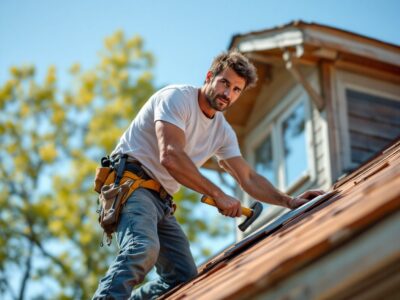
Historic districts like Springfield or Riverside have additional guidelines, such as preserving original materials or designs. Failure to comply can result in fines or project delays. Always confirm local regulations with your contractor to avoid setbacks.
Permit Requirements in Jacksonville:
- Wind mitigation certifications for coastal zones
- Historic Preservation Commission approvals
- Inspections at key project stages
- Energy efficiency standards for new roofs
Permit costs range from 150–500, depending on roof size and location. Contractors must also adhere to Jacksonville’s debris disposal laws, which may involve dumpster rentals or recycling fees.
Skipping permits risks voiding insurance coverage or reducing home resale value. Ensure your estimate to replace roof in Jacksonville includes all legal steps, from application to final inspection. Transparent contractors will outline these details upfront, providing peace of mind.
Understanding Labor Costs in Your Estimate to Replace Roof in Jacksonville
Labor constitutes 40–60% of the estimate to replace roof in Jacksonville. Rates vary based on roof pitch, accessibility, and material complexity. Steep roofs require harnesses and additional crew members, increasing hourly fees. Similarly, intricate designs with multiple valleys or skylights demand skilled labor.
Jacksonville’s competitive contractor market can lead to fluctuating labor prices. During hurricane season, demand spikes, often raising rates. Homeowners should plan replacements during drier months (October–April) for better pricing and availability.
Labor Cost Variables
- Roof pitch and height
- Removal of old materials (time and labor)
- Experience level of the crew
- Emergency repair premiums
Ask contractors if they subcontract labor, as this may affect quality control. Licensed, in-house teams often provide more consistent workmanship. Ensure the estimate specifies labor warranties, covering issues like improper installation.
To reduce labor costs, consider bundling projects (e.g., replacing gutters during roof work). Jacksonville homeowners should also inquire about off-season discounts or referral incentives. Detailed contracts prevent unexpected charges, ensuring the estimate to replace roof stays within budget.
How Insurance Impacts Your Estimate to Replace a Roof in Jacksonville
Homeowners insurance can significantly offset the estimate to replace roof in Jacksonville, especially after storm damage. Policies often cover wind, hail, or hurricane-related repairs, but deductibles and coverage limits apply. Document damage thoroughly and file claims promptly to maximize payouts.
Insurers may require pre-approval for certain materials or contractors. For example, choosing impact-resistant shingles might qualify you for discounts. Work with roofers experienced in insurance claims to navigate inspections and paperwork efficiently.
Insurance Considerations:
- Policy exclusions for wear-and-tear damage
- Required use of Jacksonville-licensed contractors
- Depreciation calculations for older roofs
- Deductibles based on hurricane vs. non-hurricane claims
After major storms, insurers may send adjusters to assess damage. Provide your contractor’s estimate to replace roof in Jacksonville to dispute lowball offers. Keep records of repairs and communications for appeals.
Upgrading to storm-resistant materials can lower future premiums. Discuss options like Class 4 shingles with your insurer and roofer. Ensure your estimate aligns with policy requirements to avoid claim denials or delays.
Top Jacksonville Roofing Contractors: What to Look For.
Selecting a reliable contractor is crucial for an accurate estimate to replace roof in Jacksonville. Verify licenses via the Florida Construction Industry Licensing Board and check for certifications from manufacturers like GAF or Owens Corning. Local experience ensures familiarity with Jacksonville’s climate and codes.

Read reviews on platforms like BBB or Google to gauge customer service and reliability. Avoid contractors who demand full payment upfront or lack physical addresses. Reputable firms provide detailed contracts, including warranties and project timelines.
Red Flags in Contractor Selection:
- No proof of insurance or bonding
- Pressure to sign contracts immediately
- Estimates significantly lower than competitors
- Poor communication or unprofessionalism
Request references from recent clients and visit completed projects if possible. Jacksonville homeowners should prioritize contractors offering free inspections and transparent estimates. Ensure they pull permits and handle inspections to streamline the process.
A trustworthy contractor will explain every line item in your estimate to replace roof in Jacksonville, from material grades to waste disposal. Clear communication and professionalism are key to a stress-free roof replacement.
Budgeting Tips for Roof Replacement in Northeast Florida
Creating a realistic budget starts with a detailed estimate to replace roof in Jacksonville. Allocate 10–15% extra for unexpected repairs, such as rotted decking or insect damage. Prioritize durable materials over cheap fixes to avoid frequent replacements.
Explore financing options like home equity loans or contractor payment plans. Jacksonville residents may qualify for energy-efficient rebates or federal tax credits, reducing net costs. Compare multiple estimates to identify fair pricing and avoid overpaying.
Cost-Saving Strategies:
- Schedule replacements during off-peak seasons
- Opt for asphalt shingles if budget-constrained
- Reuse undamaged flashing or vents
- Negotiate material discounts through contractors
Consider phased repairs if immediate full replacement isn’t feasible. For example, addressing leaks first before tackling cosmetic issues. Jacksonville’s heat can accelerate wear, so prioritize ventilation upgrades to extend roof life.
Regular maintenance, like cleaning gutters and trimming trees, also preserves your roof. Discuss long-term care plans with your contractor to maximize your investment. A well-planned budget ensures your estimate to replace roof in Jacksonville remains manageable.
Avoiding Scams: Red Flags in Roofing Estimates
Unusually low estimate to replace roof in Jacksonville often signals scams. Fraudulent contractors may cut corners on materials or skip permits, leaving homeowners liable. Always verify licenses and insurance before accepting bids.
Be wary of door-to-door solicitors post-storm, pressuring quick sign-ups. Legitimate contractors don’t require cash-only payments or high upfront deposits. Request written estimates with detailed scope of work to avoid hidden fees.
Scam Warning Signs:
- No written contract or vague terms
- Refusal to provide local references
- High-pressure sales tactics
- Lack of online presence or reviews
Research contractors via Jacksonville’s Better Business Bureau and confirm physical addresses. Scammers often use PO boxes or temporary offices. Ask for manufacturer certifications, which indicate training and material access.
Protect yourself by paying in installments tied to project milestones. Never sign over insurance checks directly to contractors. A legitimate estimate to replace roof in Jacksonville will prioritize transparency, ensuring you understand all costs and processes.
Timeline Expectations for Roof Replacements in Jacksonville
A standard roof replacement in Jacksonville takes 3–7 days, depending on size and weather. Contractors factor in potential rain delays during estimates, especially in hurricane season. Complex projects with structural repairs may extend timelines by several weeks.
Permit approvals add 1–2 weeks, so start the process early. Historic district approvals can take longer due to design reviews. Discuss scheduling with your contractor to align expectations.
Phases of Roof Replacement:
- Inspection and permit acquisition (1–2 weeks)
- Material delivery (3–5 days)
- Tear-off and installation (2–5 days)
- Final inspection and cleanup (1 day)
Communicate with neighbors about noise and debris schedules. Jacksonville’s heat can lead to early morning or late afternoon work to avoid midday sun. Ensure your contract includes penalties for unreasonable delays.
Weather disruptions are common, so build flexibility into your timeline. Reputable contractors provide regular updates, keeping homeowners informed. Understanding these phases helps manage expectations for your estimate to replace roof in Jacksonville.
Finalizing Your Estimate to Replace Roof: Next Steps
After approving an estimate to replace roof in Jacksonville, sign a detailed contract outlining project scope, payment terms, and warranties. Confirm start and completion dates, and discuss contingency plans for weather delays.
Submit required permits and notify your HOA if applicable. Historic districts may require additional approvals, so ensure all paperwork is filed. Schedule a pre-installation walkthrough to address last-minute concerns.
Post-Estimate Checklist:
- Secure financing or insurance approvals
- Confirm material delivery dates
- Arrange temporary storage for vehicles
- Plan for noise and debris management
Stay in close contact with your contractor during the project. Document progress with photos and address issues immediately. Jacksonville homeowners should inspect the finished roof and ensure cleanup meets agreed standards.
Once work concludes, obtain warranty documents and permit closure notices. Keep these records for future sales or insurance claims. A well-executed roof replacement protects your home and validates the estimate to replace roof in Jacksonville.
Environmental Impact of Roofing Choices in Jacksonville
Eco-friendly materials can reduce the environmental footprint of your estimate to replace roof in Jacksonville. Metal roofs, made from recycled content, are 100% recyclable and reflect heat, lowering energy use. Similarly, cool roofing membranes minimize urban heat island effects.
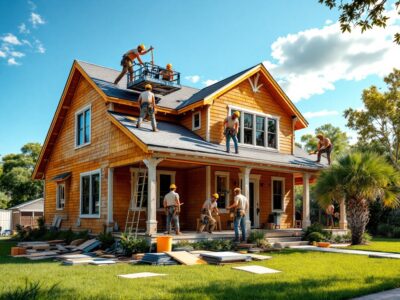
Avoid traditional asphalt shingles, which contribute to landfill waste. Instead, opt for sustainable options like rubber slate or reclaimed clay tiles. Jacksonville’s recycling centers often accept old roofing materials, diverting waste from landfills.
Green Roofing Benefits:
- Energy savings up to 20% with reflective materials
- Reduced stormwater runoff via green roofs
- Longer lifespans decrease replacement frequency
- Eligibility for Jacksonville’s green building incentives
Discuss solar-ready roofing if considering future panel installations. Jacksonville’s sunny climate makes solar integration cost-effective. Some contractors offer integrated solar shingles, blending efficiency with aesthetics.
By choosing sustainable materials, homeowners align their estimate to replace roof in Jacksonville with environmental goals. Rebates and tax credits further offset costs, making green choices both eco-friendly and economical.
Financing Options for Roof Replacements in Jacksonville
Financing a roof replacement in Jacksonville eases the burden of upfront costs. Home equity loans offer low interest rates, while contractor financing plans allow staggered payments. Explore FHA Title I loans, which cover home improvements without equity requirements.
Jacksonville residents may qualify for energy-efficient financing programs, such as PACE (Property Assessed Clean Energy), which ties repayments to property taxes. Always compare APRs and terms to find the best fit for your estimate to replace roof.
Popular Financing Methods:
- Credit cards with 0% introductory APR
- Personal loans from local credit unions
- Insurance claim advances
- Manufacturer rebates or discounts
Consult a financial advisor to assess long-term impacts on your budget. Avoid high-interest options unless necessary. Some Jacksonville contractors partner with lenders to offer exclusive rates, reducing overall costs.
Prioritize loans with flexible repayment terms to accommodate unexpected expenses. Clear communication with lenders and contractors ensures your estimate to replace roof in Jacksonville remains affordable without compromising quality.
Emergency Roof Repairs: What Jacksonville Homeowners Need to Know.
Emergency roof repairs often arise from storm damage or sudden leaks, impacting your estimate to replace roof in Jacksonville. Contact licensed contractors immediately to prevent water intrusion and mold growth. Temporary tarping may be necessary while awaiting permanent fixes.
Document damage for insurance claims, noting dates and causes. Jacksonville’s frequent thunderstorms mean emergency services are in high demand; prioritize contractors offering 24/7 response.
Emergency Repair Steps:
- Safely inspect for visible damage
- Mitigate water entry with tarps
- Contact insurers and contractors
- Save receipts for reimbursement
Emergency repairs can add 500–2,000 to your estimate to replace roof in Jacksonville. Discuss contingency plans with your contractor, including rapid material sourcing. Keep a list of trusted pros handy before storm season.
Prevent future emergencies with regular inspections, especially after severe weather. Jacksonville homeowners in flood-prone areas should consider proactive reinforcements, like hurricane straps, to minimize risks.
Roofing Maintenance Tips Post-Replacement
Protecting your investment starts with routine maintenance after a roof replacement. Schedule bi-annual inspections to check for loose shingles or debris buildup. Jacksonville’s humidity requires vigilant gutter cleaning to prevent water damage.
Trim overhanging branches to reduce debris and critter access. Inspect flashing around chimneys and vents, as these areas are prone to leaking and cause issues later.
How to Choose Eco-Friendly Roofing Materials
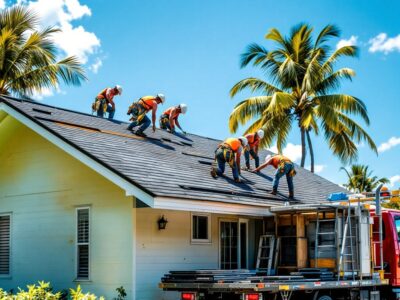
Selecting eco-friendly roofing materials is essential for reducing environmental impact and improving energy efficiency in your estimate to replace roof in Jacksonville. Sustainable options like recycled metal, solar tiles, and cool roofs not only lower carbon footprints but also align with Jacksonville’s green building initiatives. Materials such as metal roofing reflect sunlight, reducing indoor cooling costs by up to 25%, while solar tiles generate renewable energy. Homeowners should prioritize products with high recycled content and certifications like ENERGY STAR® to ensure quality and sustainability.
Jacksonville’s climate demands materials that withstand humidity and storms. For example, rubber roofing made from recycled tires resists mold and impact damage, making it ideal for Florida’s weather. Consult contractors familiar with eco-installations to ensure proper ventilation and insulation, which maximize energy savings.
Eco-Friendly Material Options:
- Recycled metal roofing (50–75% recycled content)
- Solar shingles integrated with photovoltaic cells
- Cool roofs with reflective coatings
- Reclaimed clay or slate tiles
When evaluating your estimate to replace roof in Jacksonville, factor in long-term savings from energy efficiency and tax incentives. The federal Solar Investment Tax Credit (ITC) can offset 30% of solar roofing costs. Additionally, Jacksonville Electric Authority (JEA) offers rebates for energy-efficient upgrades.
Avoid materials with short lifespans, as frequent replacements negate environmental benefits. Instead, opt for durable choices like standing-seam metal, which lasts 50+ years. Partner with contractors who recycle old roofing materials to minimize landfill waste, further enhancing your project’s sustainability.
The Role of Home Inspections in Estimate to Replace Roof
A thorough home inspection is critical for generating an accurate estimate to replace roof in Jacksonville. Inspectors assess roof integrity, identifying hidden issues like water damage, rot, or inadequate ventilation that impact costs. In Jacksonville’s humid climate, inspections often reveal mold or deteriorated decking, which require immediate repairs to prevent structural issues.
Inspections also verify compliance with local building codes, such as wind mitigation requirements for coastal areas. Contractors use inspection reports to tailor material recommendations, ensuring your roof meets Jacksonville’s weather demands. Skipping this step risks underestimating project scope and budget overruns.
Key Inspection Findings Affecting Estimates:
- Structural damage from pests or moisture
- Existing insulation or ventilation deficiencies
- Code violations requiring upgrades
- Storm-related wear (cracked shingles, loose flashing)
Post-inspection, discuss findings with your contractor to adjust the estimate to replace roof in Jacksonville. For instance, reinforcing trusses or upgrading underlayment may add costs but prevent future repairs. Inspections also help negotiate insurance claims by documenting storm damage.
Choose inspectors certified by InterNACHI or ASHI for reliable assessments. Regular pre-replacement inspections extend roof lifespan and ensure your investment aligns with Jacksonville’s safety standards.
Jacksonville’s Historic Districts: Special Roofing Considerations
Replacing a roof in Jacksonville’s historic districts, such as Avondale or San Marco, requires adherence to strict preservation guidelines. Your estimate to replace roof must include materials matching original designs, like wood shakes or clay tiles, which can be costlier than standard options. The Jacksonville Historic Preservation Commission (JHPC) mandates approvals for alterations, extending project timelines.
Contractors must source period-appropriate materials and replicate historic craftsmanship, increasing labor costs. For example, custom slate or copper roofing may be required, doubling expenses compared to asphalt shingles. Always verify JHPC guidelines before finalizing plans to avoid fines or redesigns.
Historic District Requirements:
- Use of approved, era-specific materials
- Replication of original architectural details
- JHPC review and approval process
- Higher labor costs for specialized techniques
Include contingency funds in your estimate to replace roof in Jacksonville for unexpected repairs, such as reinforcing antique trusses. Work with contractors experienced in historic projects to navigate permits and preservation standards.
Failure to comply can delay permits or result in legal action. Prioritize JHPC-approved contractors who balance authenticity with modern durability, ensuring your roof meets aesthetic and functional needs.
What You Need to Know About Estimate to Replace Roof in Jacksonville
An accurate estimate to replace roof in Jacksonville is more than a budget—it’s a roadmap for protecting your home. Jacksonville’s climate and regulations make detailed estimates vital, as overlooking factors like wind resistance or permits can lead to costly mistakes. Homeowners should view estimates as collaborative tools, refining them with contractor input to balance cost and quality.

Emerging trends, such as climate-resilient materials and solar integration, are reshaping local roofing practices. Future-proof your investment by discussing innovations like hurricane-resistant synthetic tiles or smart roof sensors during estimates.
Final Considerations:
- Align materials with Jacksonville’s weather challenges
- Verify contractor familiarity with local codes
- Explore financing for energy-efficient upgrades
- Prioritize warranties covering labor and materials
Regularly review and update your estimate to replace roof in Jacksonville as material costs or regulations evolve. Partnering with trusted professionals ensures transparency, compliance, and peace of mind, safeguarding your home against Florida’s harsh elements for decades.
continue reading
Related Posts
Understanding Duval County’s Unique Climate Challenges Duval County, encompassing Jacksonville
SERVING TAMPA, ST. PETE & ORLANDO
Empowering Your Vision
CENTRAL FLORIDA

CALL TODAY AT (813) 644-2213
Custom Roof Solutions is proud to serve Tampa & Orlando homeowners and businesses with industry-leading roofing and solar services. Whether you need to protect your property from the unpredictable Florida weather or lower your energy costs with solar power, our experienced team is here to provide reliable solutions tailored to your needs.
SERVING JACKSONVILLE AREAS
Empowering Your Vision
NORTH FLORIDA
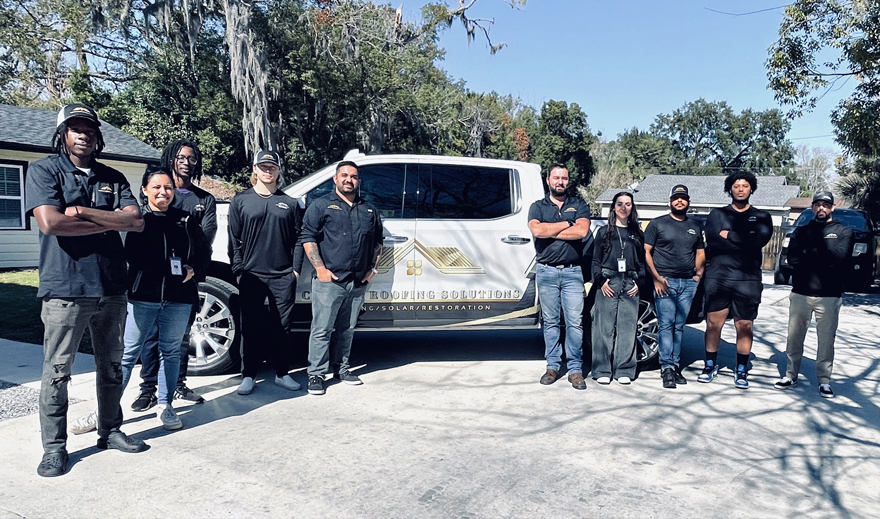
CALL TODAY AT (904) 808-3550
At Custom Roof Solutions, we understand Jacksonville’s unique weather conditions and architectural styles. Whether it’s protecting your home from hurricane-force winds, foof repairs or enhancing its curb appeal with a modern design, our experienced team delivers superior results and ensures long-lasting durability with our premium materials.
